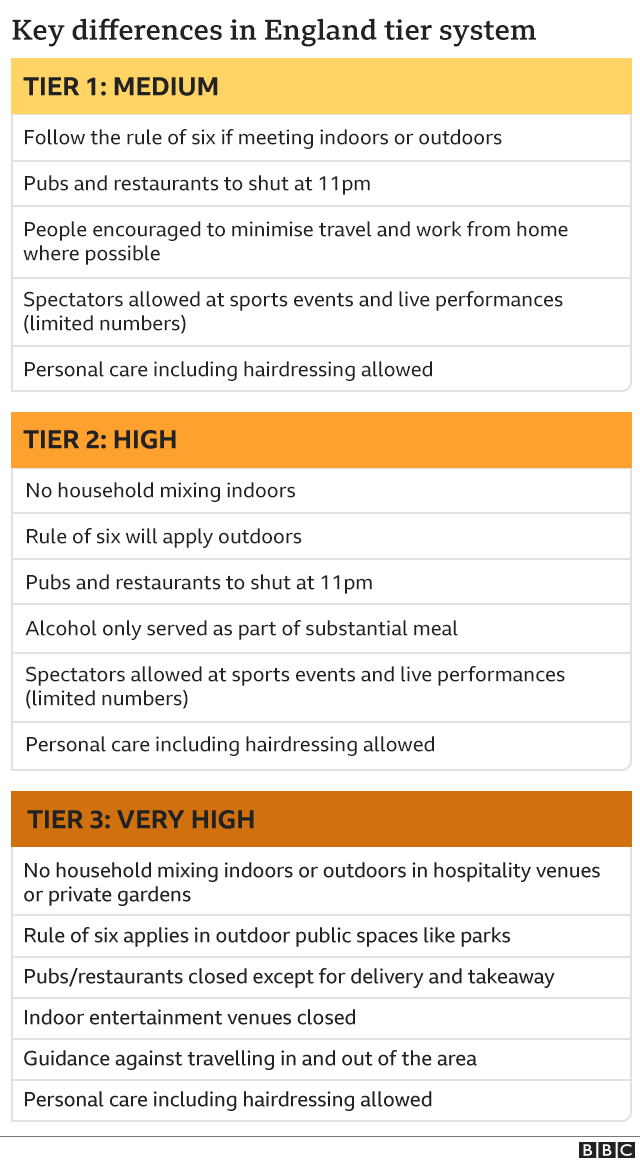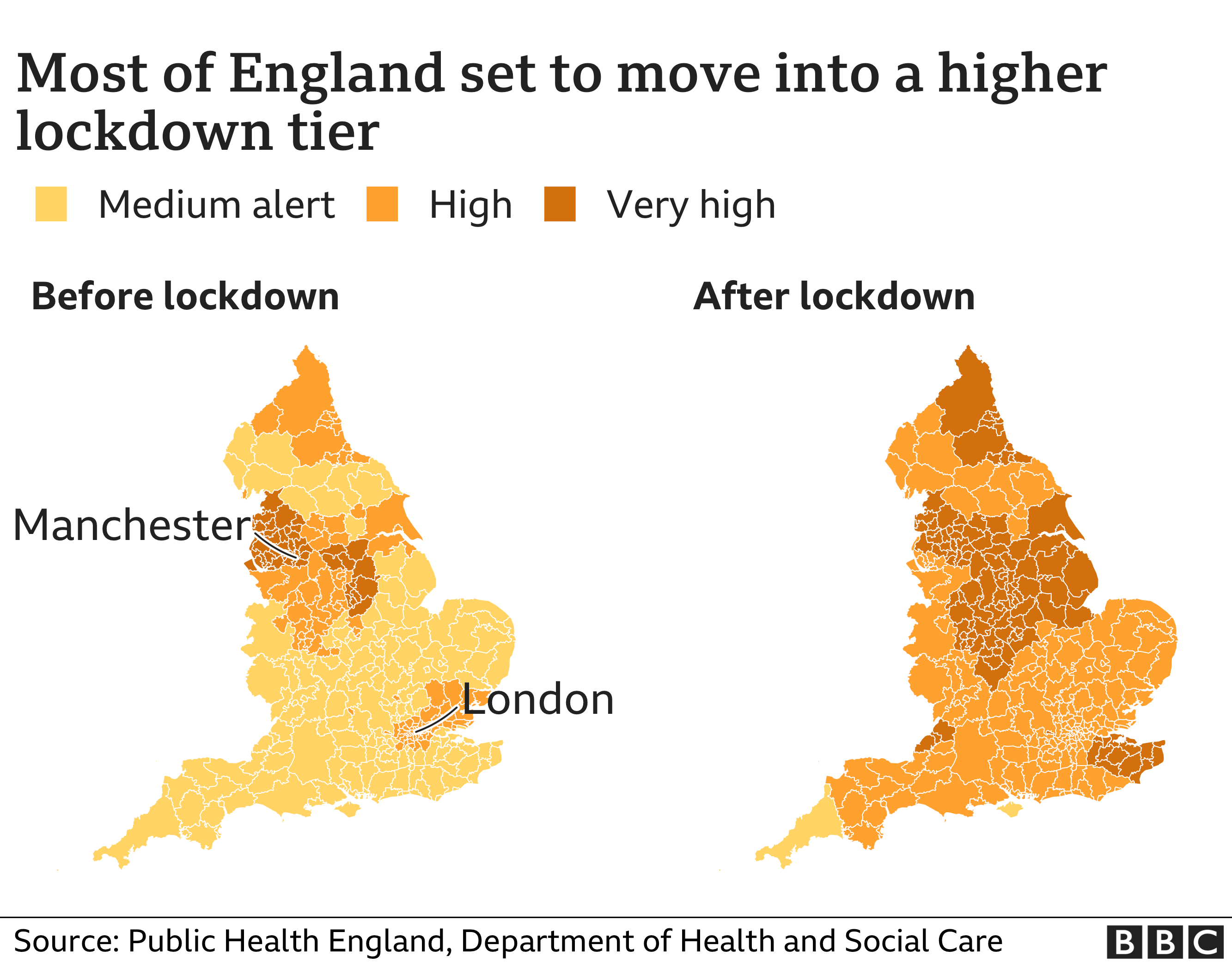
Covid: PM calls for 'unity' as he agrees to publish data behind new tiers
Boris Johnson has agreed to publish the health, economic and social data behind England's new tier system later, as he seeks to avert a Commons rebellion.
MPs will vote on the measures on Tuesday, and numerous Conservative MPs have demanded to see the evidence government is basing its new system on.
Writing to the Covid Research Group of around 70 MPs - who are sceptical of the new rules - Mr Johnson called for "unity and resolve".
Labour is yet to decide on its stance.
BBC political correspondent Iain Watson said that by publishing the data the PM was conceding "a key demand of the rebels".
- Covid infections fall by 30% over lockdown - study
- Student Covid testing begins for Christmas exodus
- Covid 'could delay cancer advances by over a year'
England's new system - due to replace the national lockdown when it expires on Wednesday - will see regions placed in one of three tiers: medium, high and very high.
Most of England will be in the highest two tiers, with tight restrictions on bars and restaurants and a ban on households mixing indoors. Only Cornwall, the Isle of Wight and Isles of Scilly will be in the lowest tier.
The PM's letter to the Covid Research Group is his second letter to MPs over the weekend, as he seeks to reassure them about the measures.
In an earlier letter to all MPs and peers, the prime minister said the rules in some areas could be eased in December, MPs could vote again on the measures in January and the tier system could end on 3 February.
But Conservative MPs have complained their constituencies are entering one of the tougher tiers, despite cases in their areas falling, and asked to see the data behind the measures.


The contents of one document could determine the size of Tuesday's Conservative revolt.
The government has conceded a key demand of the rebels - to produce an assessment of the economic and social impact of the restrictions.
Put very crudely, MPs want to know if the lives these tiers will save will outweigh livelihoods that will be lost.
Privately, some other potential rebels are indicating they are prepared to be convinced by the government's arguments.
And Mr Johnson's efforts to win over his sceptics seem to be making some headway.
The former minister Conor Burns - an old ally of Mr Johnson's - had been critical of how the government intended to impose its restrictions.
But he told the Westminster Hour he won't be voting against them, saying: "We've got the vaccine coming over the horizon. If the government really feels we need to do this then I'm probably prepared to swallow hard and support them."
But some other potential rebels have told the BBC that they are withholding their support unless and until they see the hard data behind the PM's decisions.
In his letter to the Covid Recovery Group, Mr Johnson said he'd "responded positively" to their "constructive proposals". The next 24 hours will see him continue the campaign of persuasion with his own backbenchers.

Tory MP Steve Baker has been among those calling to see the data the government was basing the new measures on.
He tweeted on Saturday that MPs were "glad to share in the burden of decision", but added: "That's why we need the information necessary to show the government's restrictions will do more good than harm, in full and in time."
Mr Johnson said in his latest letter that disagreement on how to manage the pandemic was "natural", but that the tiered system was a "balanced approach" that would help protect the NHS, keep schools open and allow the economy to reopen safely.
"There is every reason to hope and believe that the worst is nearly behind us, so now more than ever is the time to demonstrate unity and resolve," Mr Johnson said.
The PM also said the government would:
- Introduce daily testing for those who have had close contact with a Covid case - an alternative to the current requirement for contacts to self isolate for 10 days
- Carry out more rapid tests to identify asymptomatic carriers and protect the vulnerable
- Publish the results of surveys on compliance, which reveal why people breach self-isolation


- LOCKDOWN LOOK-UP: The rules in your area
- SOCIAL DISTANCING: What are the rules now?
- SUPPORT BUBBLES: What are they and who can be in yours?
- FACE MASKS: When do I need to wear one?
- TESTING: How do I get a virus test?

Meanwhile, a major study from Imperial College London has found that coronavirus infections in England fell by about a third over lockdown.
Some of the worst-hit areas saw the biggest improvements, but cases still remained high across England.
Researchers estimated that the virus's reproduction (R) rate had fallen to 0.88, meaning the epidemic is shrinking.

Elsewhere in the UK, Northern Ireland has begun a two-week circuit-breaker lockdown, while in Scotland each area has been placed in one of five tiers.
In Wales, First Minister Mark Drakeford said pubs, restaurants and bars will be subject to stricter restrictions - which are not yet finalised - in the run-up to Christmas. They will come into force from Friday, 4 December.
On Sunday, a further 12,155 positive coronavirus test results were recorded across the UK, bringing the total to 1,617,327.
A further 215 deaths within 28 days of a positive test were also recorded, bringing the total to 58,245.

